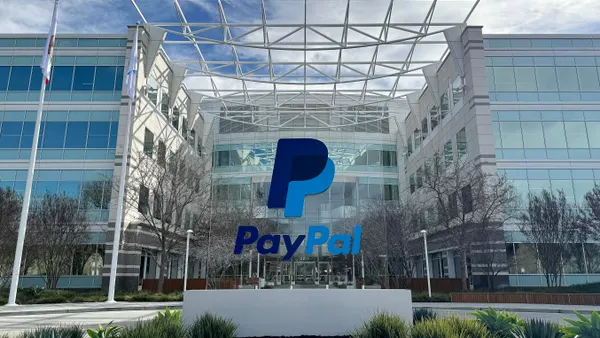Dive Brief:
- Buy now, pay later provider Affirm has prepared for more regulatory scrutiny by taking care to explain its underwriting decisions, in contrast to the company’s rivals, CEO Max Levchin contended during a conference appearance last week.
- “I think a fair amount of our competitors believe that they’ll either talk their way out of [regulatory attention] or hide their way out of it,” Levchin said Sept. 7 at a Goldman Sachs investor conference in San Francisco.
- As payments companies assess how they can incorporate artificial intelligence into their business operations, Levchin also said the installment lending company will never employ AI in its underwriting process. “We’ll use [machine learning],” he said. “But AI in today’s parlance means something entirely different, and nobody wants to have their underwriting model hallucinate sometimes. And so we’re very, very far away from that sort of thing.”
Dive Insight:
The specter of regulation has loomed over the BNPL industry since the Consumer Financial Protection Bureau launched an inquiry into the five biggest players in the space – Affirm, Afterpay, Klarna, PayPal and Zip – in December 2021.
The bureau released its BNPL report last September, noting it was considering rules or “interpretative guidance” to ensure BNPL providers adhere to laws that apply to credit card companies. A spokesperson for the CFPB didn’t immediately respond to a request for comment Monday.
BNPL isn’t covered by the Truth in Lending Act, which applies to most kinds of consumer credit. Among other aspects, the bureau has expressed concern with consumer disputes of BNPL transactions.
“At our scale, the eye of the regulator is upon us,” Levchin said. “From the very beginning, our point of view was, you either hide, but then you can’t grow, or you embrace it and then you try to build bridges and communicate exactly who you are and how you do what you do.”
That means Affirm has to be willing to face examination over things like fair lending and explainability of its risk models, Levchin said. “You tell someone, ‘Sorry, you’re declined,’ you can’t just say, ‘and we’re not going to explain why,’” he said. “It has to be fairly understandable and human-readable.”
Levchin believes Affirm is prepared for more regulatory attention. Although the BNPL provider isn’t a bank, he said its fair lending results are known to the Federal Deposit Insurance Corporation, as that agency examines the banks Affirm works with, including Celtic Bank and Cross River Bank.
“I very much care about what FDIC thinks of the quality of credit that we produce,” Levchin said.
Levchin added that the company feels “just fine about our ability to navigate” further regulatory scrutiny. There is a cost, however, to facing more regulation, in the form of compliance hiring and spending, he acknowledged.
Swedish rival Klarna “wholeheartedly” supports BNPL regulation, a spokesperson said Monday. “Klarna is a licensed European bank already offering regulated products, and we’ve been calling for regulation for some time,” the spokesperson said. “We are continuing to work with the CFPB and other stakeholders to accelerate this to improve outcomes for all consumers.”
A spokesperson for Sydney-based Zip didn’t immediately respond to a request for comment.











